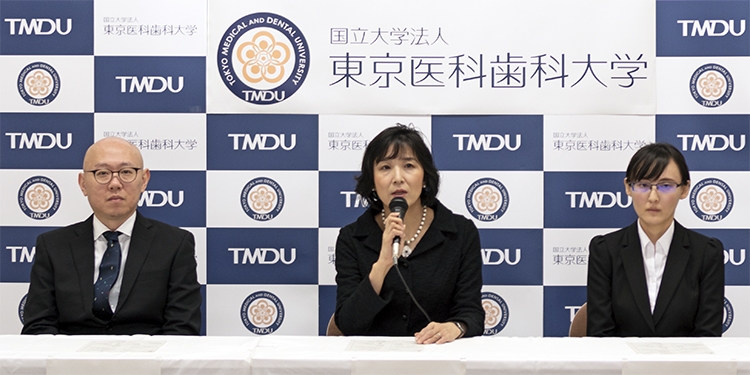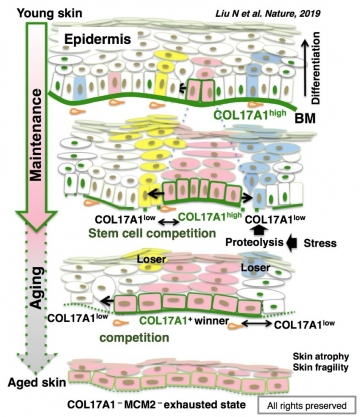Stem cell competition offers a mechanism for skin youthfulness and ageing

Emi Nishimura, MD, PhD
Professor, Stem Cell Biology
Medical Research Institute, TMDU
Professor, Stem Cell Biology
Medical Research Institute, TMDU
Tokyo Medical and Dental University(TMDU)-led study published in Nature shows that epidermal stem cells in the skin compete with each other to eliminate stressed, unfit cells; this maintains skin youthfulness, but with time also causes the skin to age.
Tokyo, Japan – Aging is a process that results from the accumulation of damage due to failed repair and defense functions. There have been many attempts to understand the process and mechanisms by which tissue aging occurs; none have provided a clear and comprehensive explanation, until now.
In a new study published in Nature, a research team led by experts from Tokyo Medical and Dental University(TMDU) investigated structural characteristics, cellular dynamics, and protein expression in young and aged skin. They found that Collagen XVII, a component of stem cell connections to extracellular matrix, was destabilized by genomic and oxidative stresses, such as ultraviolet light, thereby generating unfit cells that are shed from the skin surface by stem cell competition.
Tokyo, Japan – Aging is a process that results from the accumulation of damage due to failed repair and defense functions. There have been many attempts to understand the process and mechanisms by which tissue aging occurs; none have provided a clear and comprehensive explanation, until now.
In a new study published in Nature, a research team led by experts from Tokyo Medical and Dental University(TMDU) investigated structural characteristics, cellular dynamics, and protein expression in young and aged skin. They found that Collagen XVII, a component of stem cell connections to extracellular matrix, was destabilized by genomic and oxidative stresses, such as ultraviolet light, thereby generating unfit cells that are shed from the skin surface by stem cell competition.

“Human skin eliminates stressed, unfit stem cells from the
epidermal stem cell pool by cell–cell competition to
promote skin rejuvenation; this helps to avoid skin aging,
which includes thinning, fragility, sagging, aged spots,
white spots, and poor wound healing,” says Emi Nishimura,
corresponding and senior author of the study. “This may
constitute Darwinian natural selection of stem cells.”
Advanced aged skin consists of exhausted cells with low
amounts of Collagen XVII—among these cells, competition
was impaired, and characteristics of young skin, such as
the ability to adequately respond to damage and stress,
were lost.
“Forced expression of Collagen XVII maintains skin
youthfulness,” say Nan Liu and Hiroyuki Matsumura, lead
authors on the study. “We speculate that our new strategy
may restore skin aging and prevent aging-associated
diseases.”
epidermal stem cell pool by cell–cell competition to
promote skin rejuvenation; this helps to avoid skin aging,
which includes thinning, fragility, sagging, aged spots,
white spots, and poor wound healing,” says Emi Nishimura,
corresponding and senior author of the study. “This may
constitute Darwinian natural selection of stem cells.”
Advanced aged skin consists of exhausted cells with low
amounts of Collagen XVII—among these cells, competition
was impaired, and characteristics of young skin, such as
the ability to adequately respond to damage and stress,
were lost.
“Forced expression of Collagen XVII maintains skin
youthfulness,” say Nan Liu and Hiroyuki Matsumura, lead
authors on the study. “We speculate that our new strategy
may restore skin aging and prevent aging-associated
diseases.”
In addition, the researchers showed that the application of drugs that maintained or increased Collagen XVII expression could facilitate wound healing in mice by promoting epidermal stem cell competition, which is impaired in aged skin. This discovery may represent an important advancement in tissue regeneration and anti-aging medicine.
The article, “Stem cell competition orchestrates skin homeostasis and aging,” was published in Nature at DOI: 10.1038/s41586-019-1085-7
The article, “Stem cell competition orchestrates skin homeostasis and aging,” was published in Nature at DOI: 10.1038/s41586-019-1085-7
Summary:
Aging results from the accumulation of cellular damage due to failed repair and defense functions. Here, a Tokyo Medical and Dental University(TMDU)-led research team found that Collagen XVII stability in epidermal skin cells was affected by genomic stress, and that subsequent competition among epidermal stem cells contributed to prevention of skin aging and maintenance of skin youthfulness. The application of collagen-modifying drugs could support wound healing and promote skin regeneration, thereby reducing skin aging.
Correspondence to:
Emi Nishimura, MD, PhD
Professor, Stem Cell Biology
Medical Research Institute, TMDU
E-mail:nishscm(at)tmd.ac.jp
*Please change (at) in e-mail addresses to @ on sending your e-mail to contact personnels.
Professor, Stem Cell Biology
Medical Research Institute, TMDU
E-mail:nishscm(at)tmd.ac.jp
*Please change (at) in e-mail addresses to @ on sending your e-mail to contact personnels.

